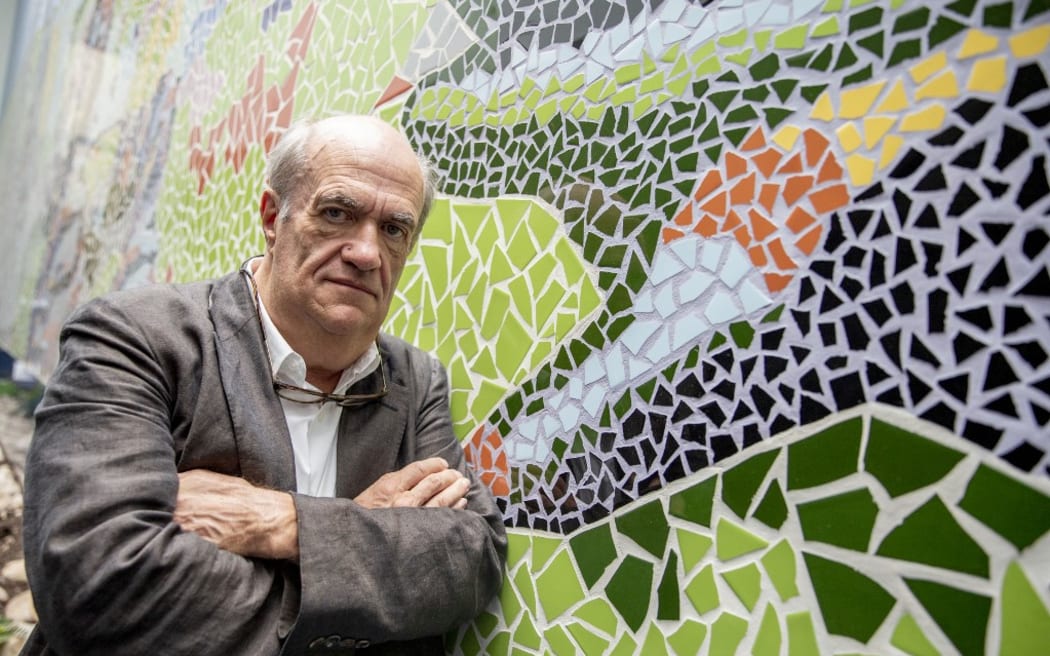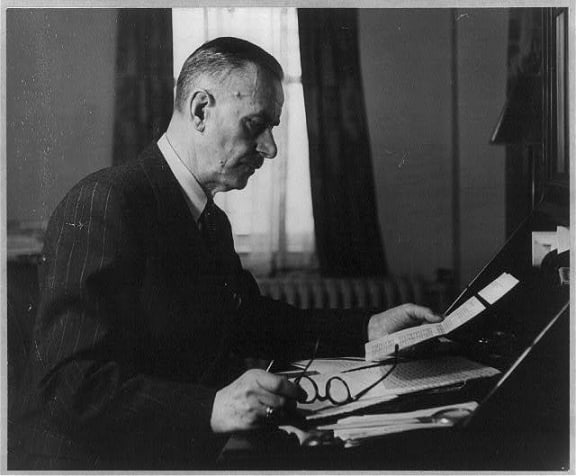The author of 10 novels, Colm Tóibín’s latest is 2021’s Folio Prize winning The Magician, a fictionalised account of the life of Thomas Mann.
Tóibín’s novels The Blackwater Lightship and The Master were both shortlisted for the Booker Prize, the latter winning the 2006 International Dublin Literary Award.
And a new collection of essays A Guest at the Feast begins by taking us back to his childhood. Starting with growing up in Enniscorthy, County Wexford he also tracks the changes in Ireland, its church and state intertwined with his own life.
Many biographies have been written about German novelist Mann, so what drew Tóibín write a novel about him?

Colm Tóibín Photo: ALBERT LLOP
“What I'm interested in doing is creating an illusion. I suppose what a biographer is interested in doing is offering you knowledge information. and giving you a sort of understanding,
“I want to give you much more than that. I want to bring you into the room. I don't just want to bring you into the room, I want to bring you into the feelings that are going on in the room. I want to bring you into the undercurrents in the room.
“And then I want to bring you further I want to bring you into Thomas Mann's mind, I want you to have you see the world through his eyes, feel what he feels, remember what he remembers.”
Thomas Mann, he tells Kim Hill, is currently a somewhat unfashionable writer.
“When I was in my late teens, he was very fashionable. So, I'm still sort of locked into that period when everyone was reading the Magic Mountain and when movie of Death in Venice had just come out.”
When Mann’s diaries were published in the 1980s his closeted homosexuality was revealed, Tóibín says.
“He would give a lecture and there will be 2000 Germans listening to his scholarship, and he will be wearing a three-piece suit. And then, in his diary, later, he would write in the third row, there was a young man that caught his eye, his gaze, his beauty, and that he was constantly watching and thinking about young men, really most of the time, but while being married with six children.”
Mann’s wife Katia was an extraordinary woman, he says.
“She is the most interesting person. She's from an assimilated Jewish family in Munich, she was one of the first German women to go to university to study science.
“Her grandmother was the most famous German feminist of the age. And her own family was tremendously rich and cultured. Her brother was studying conducting with Gustav Mahler, they knew everybody.”
Thomas and Katia’s six children complicated the writing process, he says.
“He had six children, which for any novelist is a nightmare. Really, I wanted to cut it in half and just give them three, but I couldn't do that because I had to follow the facts to some extent.
“But I don't know of any novelist who would who would welcome the arrival of six children into a novel.”
Katia was aware of Mann’s homosexuality, he says.
“When he was 75, which would be in 1950, they were in Switzerland and they were staying in some posh hotel; Thomas Mann, his wife and his daughter could not have been more respectable. And Thomas Mann fell in love with a waiter.
“How do we know? Because he writes about it in his diaries. And what he says in his diaries is that I would exchange world fame for the favours of this man.
“And his wife and his daughter organised, he was a bit depressed, and they thought it would cheer them up just to see this waiter more.”
The waiter was subsequently tracked down, he says.
“He did remember Thomas Mann, and he knew he was being flirted with. But this was being overseen by Thomas Mann's wife, and by his daughter, and he's 75 at this time, I mean, there's hope for us all.”
Two of his children Klaus and Erika become very famous in their own right, he says.
“In the early 1920s German children, teenagers, had no interest in their parents’ authority, all forms of authority after the Kaiser, the loss of the First World War went.
“So, the two eldest ones, Erika and Klaus became poster children for the new freedom in Germany. They slept with whoever they liked, they were they were mainly gay, they wrote books, they travelled, they said whatever they liked, and they were photographed and written about all the time, and they performed in the theatre, there was no end to the amount of publicity they got.”

Thomas Mann Photo: Wikicommons
They would come home regularly to Munich to their father looking for money, he says.
“He’s locked in his study writing some great book, and all he wanted was the right to be gay, but he couldn't have it, so he had to live it vicariously through them.”
So busy were they enjoying themselves, they didn't notice what was really going on around them in Germany, he says.
“The inflation didn't affect the Mann's because he was getting money from the sale of his books, in France, or in England or America. But they were having such a good time the children, that they didn't notice the rise of Hitler, and it a really took Thomas Mann by surprise.”
It took some time for Mann to take a stand against Hitler, Tóibín says. And Even by 1933 Mann is writing books in German that he knows will not be published in his own language, Tóibín says.
“Thomas Mann realises that his own books will be taken off the bookshelves in Germany, which means that as he's writing the sentence, that sentence will probably not appear in print.
“It will appear in translation, but not in the German he’s writing. He's losing his language. And he postpones this for as long as possible. His books are not burned in the big Nazi bonfire of famous writers in 1933 and because he's won the Nobel Prize, he's above all the other writers. He's a great German figure, so they don't pick on him in 1933.
“And he lets it go, he doesn't denounce Hitler in ‘34, ’35. It's really getting late, he's the last one left. He's obviously not living in Germany, he couldn't safely go back in. But he's still playing this funny game with the Nazis.”
Eventually he does publicly denounce the Nazis.
Mann’s family was terribly afflicted by suicide, Tóibín says.
“His first sister, a bad romance. His second sister, with the years of inflation, which did cause people to commit suicide in Germany in the 1920s, she was also addicted to morphine, and then of his six children, two committed suicide.
“But I think the most heart-breaking was the first. I mean, he was dead by the time his son Michael committed suicide, but the suicide of his son Klaus.
“He’s managed to get his six children out of Europe, with visas into America in the late ‘30s early 1940s, which was a very difficult thing to do.
“Got his brother out, he got his sister in law out, got them all safely to America. And Klaus actually had an American uniform on for 43, 44 45.
“He was an American soldier and American citizen. But after the war, the problem for people who had been in exile was Germany didn't particularly want them back.”
Klaus had been a high-profile critic of the Nazis but once the war ended, found himself with no role in life, he says.
“No one was interested now in anti-Fascism, it was all over, the Cold War was beginning.
“And so, he had nowhere to go. And he was taking morphine. He was taking various other drugs, but he really wasn't writing much. And he really, I suppose he'd run out of road, and he killed himself in 1949 in Cannes.”
Mann himself was overshadowed by his own successful business man father who died when Mann was a teenager.
“It was as though he never in his life stopped wanting to impress this ghostly Father. He was a very good businessman Thomas Mann. And he was very respectable in the sense that he lived in the domestic sphere. He didn't go out. He wasn't bohemian, he didn't go out to cafes in the evening, or bars or anything like that.
“And he became, of course, the most famous German at the age with Einstein. And was always as though there was something about the father in the background.
“Am I okay, now, Father, even though I didn't become a businessman, look what I did become. And of course, the problem was, the father wasn't there to receive this news.
“So, I think the ghostly father in this story is important.”

